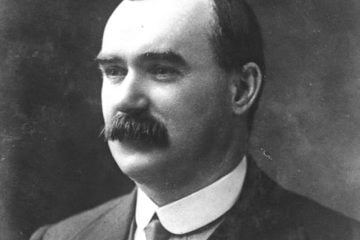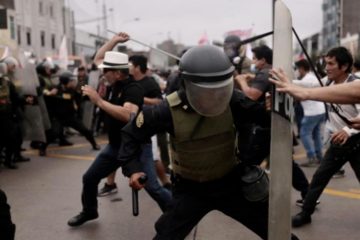Below is an article by Seb Trifa of the Bristol Marxist Society about the political situation in Romania in its historical context and the future of the class struggle and revolution in that country.
————————————
As dialecticians we understand that the present form in which a society exists is the result of a process of contradiction. As such to understand the current situation in Eastern Europe one needs to look at the developments in the last quarter of a century.
The year 1989 marked a historical moment. One by one repressive Stalinist governments fell across Europe and a movement for genuine workers’ control could have taken root, as exemplified by the Monday Demonstrations in Leipzig on 4 September when the protesters sang The Internationale. However, emboldened by the apparent success of capitalism in Western Europe and in many places encouraged by capitalist “donations”, this movement was derailed and capitalism was reinstated in Eastern Europe.
Former Stalinist high officials, exercising the same opportunism that served them well in the former regime, attached themselves to the mass movement in December. In order to pay the debts incurred by egotistical projects such as the Peoples’ Palace, the Stalinist government was forced by the IMF to export most of the food production of the county, leading to rumors that the salami available for domestic consumption was made out of cardboard. Swiftly taking control of the still state-controlled media, they ran a campaign of defamation against the other candidates, and won by a landslide. To gain the support of the Western capitalists they embarked on a vicious campaign of privatization resulting in the miners’ march on Bucharest. Once in power, in order to justify their new position, they engaged in a smear campaign against the noble terms “Communism”, and even “Marxism”. As a result, in the present day, the terms “Communism” and “Dictatorship” are used almost interchangeably.
Step forward to the capitalist crisis of 2008. In this period the Christian Democratic government had to ponder a choice between raising taxes or decreasing the salaries of government employees and pensioners. In order to cover the deficit created by the decay of markets in the European Union, the government borrowed heavily from the IMF, which promptly forced the government to pass both aforementioned measures, decreasing the salaries of state employees by 25% and pensions by 15%, in a situation where the median salary is around £200. Faced with the realities of capitalism the working class rushed into the streets in their millions asking for the resignation of the government and the President. In a situation similar to the electoral farce in Russia where reformed Stalinist Vladimir Putin rules as the de facto monarch, the puppet prime minister was forced to reign as the actual political power while President Traian Basescu weathered a referendum on his dismissal by appealing to constitutional technicalities. Faced with their powerlessness in effecting change the masses turned to electoral action.
In the 2012 legislative elections the Social Democrats in a “national unity” movement with the Liberals were voted into office. In order to consolidate their position, they increased salaries to pre-crisis levels, mainly by decreasing state spending on infrastructure. Such is the integrity of Keynesians. So, in a climate of crumbling roads, cancelled expansions to the Bucharest subway, and delayed Bucharest Airport terminal construction, the November 2014 Presidential election found the reformists in a precarious position.
The challenger, Klaus Iohannis ran on an anti-corruption ticket of the coalition Liberal and Christian Democrats. Mayor of a small town, and former teacher, he is viewed as anti-establishment. Among cries of choosing the lesser evil, he was elected despite losing the First Round in which participation reached the underwhelming figure of 64%.
So, we can see that despite the enthusiasm surrounding the election of the member of an ethnic minority and anti-establishment candidate, almost half of the registered voters failed to vote in the First Round, the Runoff surge being mainly a vote against the status quo. This enthusiasm will die a slow death as no meaningful change is implemented, possibly leading to turnouts of less than half of the voting-age population.
We, Marxists, understand that small scale tax avoidance by the working class is merely an expression of the struggle of the masses to make ends meet. This kind of corruption is prevalent in Eastern Europe because of the precarious position of the proletariat in this region. No anti-corruption politician can stop corruption without raising the material position of the working class. The already prevalent calls that politicians are detached from the plight of the masses will only get louder. We can see the workers’ rejection of opportunism and capitalism, even if it is seen by the masses as a rejection of our particular brand of capitalism, leading to support for direct democracy and workers’ control of the economy.
There remains the problem of the lingering aversion of the proletariat towards Communism. Given what the Romanian working class has been through this is not surprising. However there is support for Marxist ideas, particularly among the educated youth and unskilled workers, the polar opposites of society, for different reasons. The philosophically inclined youth unabashedly rejects idealism and through a dialectical process reaches an understanding of Marxist theory, while unskilled workers and some other layers of the working class look back to the times when they had a living wage and guaranteed employment and intuitively see the inefficiency of capitalism.
An abstract call for Communism will unfortunately gain little echo in this region. But fear not comrades! Our tactics for building communism are just as flexible as those of the capitalists. Just like the Bolsheviks, who reached the Russian masses with the simple slogan of ‘Bread, Peace and Land’, the Romanian proletariat can defend its own interests if it does so in the form of concrete arguments for mass participation in the economy under the banner of direct democracy.
In conclusion, worldwide revolution is possible, comrades, if only we adapt our tactics to the particular conditions of the various regions in which the proletariat is struggling.
by Seb Trifa, Bristol Marxists



